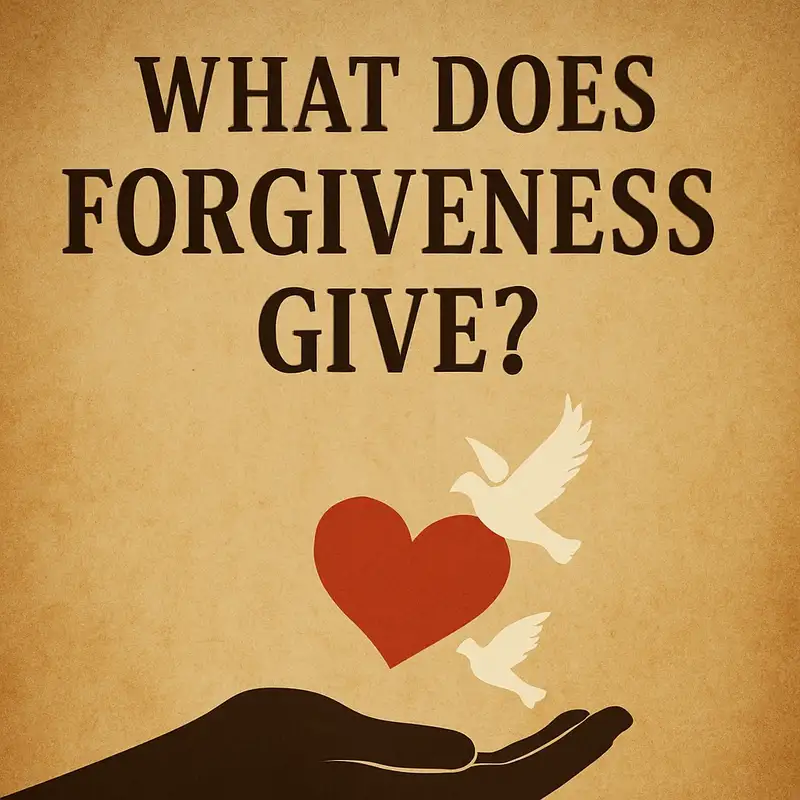What Does Forgiveness Give? (From Our 5-25-25 Worship)
The sermon uses Memorial Day as a springboard to explore forgiveness—not as a cold doctrine but as a costly, emotional gift that restores broken relationships. Joseph’s long reconciliation with his brothers (Genesis 37 – 50) becomes the primary case study.
1. Remembering and Our “Negativity Bias”
- Memorial Day reminds us to honor those “who didn’t come home,” yet people quickly forget or fixate on the wrong memories.
- Human nature clings to hurtful moments; that bias makes forgiveness especially hard.
2. Joseph’s Wound and His Opportunity (Genesis 42 – 45)
- Initial betrayal: brothers strip him of the “coat of many colors,” plan murder, then sell him (Genesis 37).
- Years later Joseph, now Egypt’s vizier, meets his starving brothers:
- He speaks harshly, demands Benjamin, and jails them three days—testing more than retaliating.
- Yet he secretly returns their silver, showing a heart already inclined toward mercy.
- Emotional reveal (Genesis 45:4-5, ESV):
“So Joseph said to his brothers, ‘Come near to me, please.’ … ‘Do not be distressed or angry with yourselves because you sold me here, for God sent me before you to preserve life.’”
3. What Forgiveness Gives
- The word “for-give-ness” hides give—it offers a second chance and reconciliation (“to be friends again”).
- True forgiveness is decided internally before it can be transacted externally.
- It does not erase memory or pain, but it refuses revenge and opens a future.
4. Joseph’s Public Act of Grace (Genesis 50:15-21)
- After Jacob dies, the brothers fear payback, beg, “Please forgive…”
- Joseph reassures them:
“As for you, you meant evil against me, but God meant it for good, to bring it about that many people should be kept alive…” (Genesis 50:20, ESV)
- He provides for them in Goshen—proof that his earlier private forgiveness is now public mercy.
5. Principles for Us
- Forgiveness hurts: Joseph “wept aloud” (Genesis 45:2). Pain does not disqualify obedience.
- Leave justice to God: “Vengeance is mine, I will repay, says the Lord.” (Romans 12:19 ESV)
- Boundaries are wise; forgiveness seeks restoration, not perpetual abuse.
- Our model is God:
- “For God so loved the world, that he gave his only Son…” (John 3:16 ESV)
- Jesus bore the agony of Psalm 22:1 on the cross so we could be forgiven.
- Eternal aim: God moves history from a banished Genesis-3 humanity to a fully restored people where “He will wipe away every tear…” (Revelation 21:3-4 ESV).
- Warning & promise: “If you forgive others…your heavenly Father will also forgive you, but if you do not…” (Matthew 6:14-15 ESV).
6. Application & Invitation
- Examine lingering wounds; begin the internal work of forgiveness today.
- Trust God with ultimate justice while setting healthy boundaries.
- Offer the gift that God first offered you; relationships—both human and divine—hang in the balance.
- The assembly is urged to seek prayer or respond publicly “while we have this invitation song.”
Key Take-Away
Forgiveness is costly giving: we absorb hurt so that, like Joseph—and ultimately like Christ—we can trade broken memories for reconciled relationships and point the world to a God who “meant it for good.”

